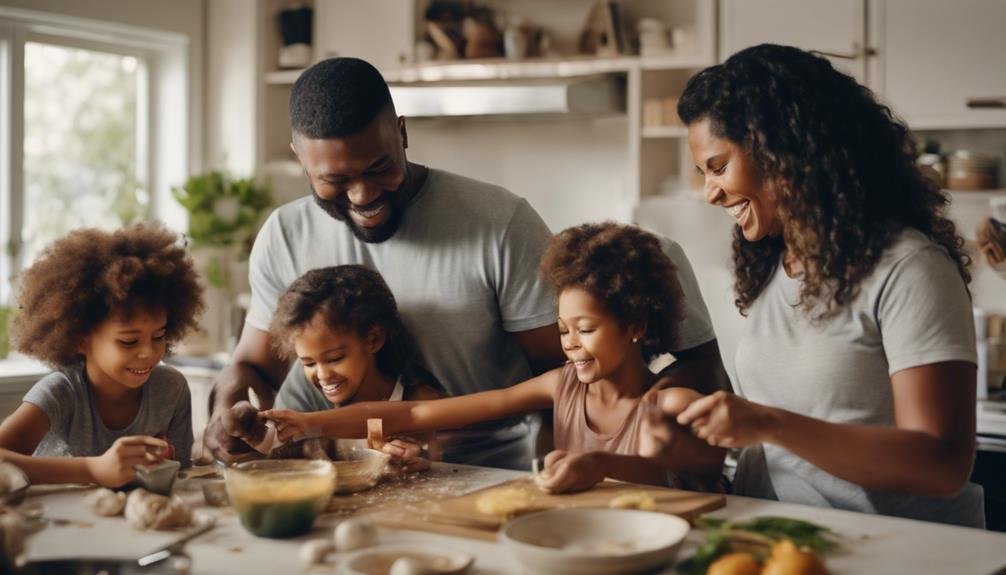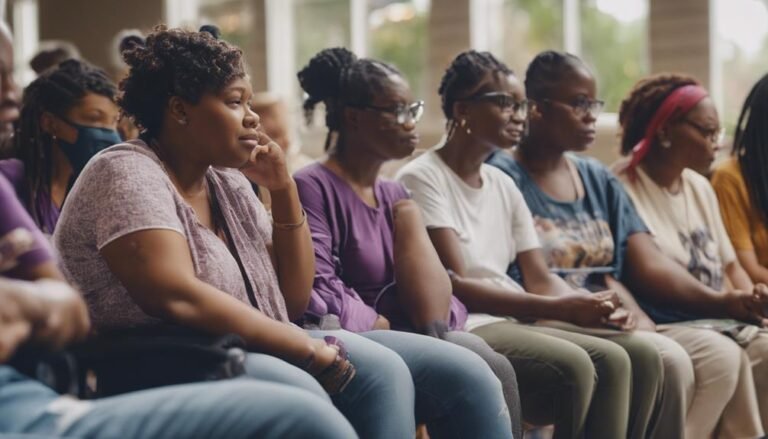To rebuild family bonds post-violence, start with clear communication. Share openly and resolve conflicts effectively. Seek professional counseling for specialized support in healing and setting boundaries. Establish clear boundaries to foster respect and safety. Allow time for healing and growth, acknowledging it’s a process. Encourage open dialogue and empathy in heartfelt conversations. Remember, trust and healing are essential for a harmonious future together.
Key Takeaways
- Establish clear communication channels for openness and understanding.
- Seek professional counseling support for specialized guidance.
- Set boundaries to promote safety, respect, and accountability.
- Allow time for healing and growth, prioritizing self-care.
- Encourage open dialogue and empathy to rebuild relationships.
Establishing Clear Communication Channels
To initiate family bonds post-violence, the first essential step is establishing clear communication channels within your family unit. Children, in particular, greatly benefit from open and honest communication as they navigate the complexities of family relationships post-abuse. By fostering transparent communication, you create a safe space for everyone to express their emotions and concerns. This open dialogue not only helps in understanding each other’s perspectives but also paves the way for effective conflict resolution and problem-solving. Through transparent communication, the family can identify underlying issues and work together to develop strategies that address them collaboratively.
As you start on this journey of rebuilding trust and connection within your family, remember that communication is the cornerstone of strong relationships. By promoting transparency and active listening, you lay the foundation for a healthier and more supportive family dynamic post-violence.
Trust that through clear communication channels, you can rebuild the bonds that were once fractured, creating a stronger and more resilient family unit.
Seeking Professional Counseling Support
Establishing clear communication channels within your family sets a strong foundation for seeking professional counseling support as you navigate the journey of rebuilding family bonds post-violence.
Professional counseling can be an essential resource in addressing the aftermath of family violence, offering specialized expertise in dealing with trauma, communication challenges, and shifting relationship dynamics.
Trained counselors can provide tailored strategies to help your family heal, fostering healthy boundaries and open dialogue essential for rebuilding trust.
Setting Boundaries and Expectations
Creating clear boundaries and expectations is a fundamental step in rebuilding family bonds post-violence, fostering an environment of safety and respect. Setting boundaries after experiencing violence within the family is essential to establish a sense of security and promote healthy relationships. By clearly outlining what’s acceptable and what’s not, you can prevent harmful behaviors from resurfacing and cultivate a space where everyone feels valued.
Establishing healthy boundaries aids in creating a supportive atmosphere where family members can communicate openly and understand each other’s needs. It’s vital to set these boundaries to promote accountability, encourage transparent communication, and support the healing process within the family unit.
Through setting boundaries and communicating expectations, you can pave the way for positive interactions, mutual respect, and ultimately strengthen the bonds that may have been strained by past experiences of violence.
Allowing Time for Healing and Growth
Give yourself the grace and space needed to heal and grow after experiencing family violence. Time is an important element in the journey of emotional recovery and trauma healing. It’s vital to take a step back, reflect, and allow yourself the necessary time to process the impact of past events.
Patience is key in rebuilding family bonds and creating a safe environment for everyone involved. By giving yourself the needed time, you can slowly work towards understanding the root causes of the violence and develop healthier coping mechanisms.
During this period of healing, it’s important to focus on self-care and seek support from trusted individuals. Surround yourself with positivity and activities that bring you peace. Embrace the process, acknowledging that healing takes time and effort.
Encouraging Open Dialogue and Empathy

Encouraging heartfelt conversations and understanding can pave the way for healing and rebuilding family bonds post-violence. By fostering open dialogue within your family, you create a safe space where each member can express their feelings without judgment.
This open communication allows for empathy to flourish, playing a crucial role in reconnecting and strengthening relationships. Through empathy, family members can acknowledge each other’s pain and trauma, fostering compassion and understanding.
Active listening, validation of emotions, and mutual respect are key components of open dialogue that promote healing and growth. When family members feel heard and understood, trust begins to rebuild, and stronger connections form.
Creating an environment where everyone feels valued and supported as they navigate the aftermath of violence becomes paramount. By practicing empathy and encouraging open dialogue, you lay the foundation for rebuilding your family’s bonds with care and compassion.
Frequently Asked Questions
How Can I Address Deep-Rooted Family Issues That Predate the Violence?
Address deep-rooted family issues by exploring therapy options for healing past traumas. Use effective communication strategies to navigate complex family dynamics. Build trust through emotional support and resolve conflicts with patience and understanding.
Should Children Be Involved in Setting Boundaries After a Violent Incident?
When it comes to children in setting boundaries post-violence, consider their role wisely. Guide them with love, provide a support system. Use tools for communication, therapy options, and emotional support. Build healthy boundaries through open dialogue for a healing journey.
Can Family Members Rebuild Trust Without Professional Help?
You can rebuild trust within your family without professional help by prioritizing open communication, setting healthy boundaries, and supporting each other. Remember, trust building, healing, and forgiveness are a journey that requires empathy and a strong support system.
What if One Family Member Refuses to Participate in the Healing Process?
If one family member refuses to join the healing process, gently encourage them to contemplate individual therapy for personal growth. Prioritize open communication, patience, and understanding. Seek mediation support when needed. Stay committed to rebuilding relationships with care and compassion.
Is It Normal for Family Members to Experience Conflicting Emotions During Reconciliation?
It’s normal to experience conflicting emotions during reconciliation. The healing journey can feel like an emotional rollercoaster, stirring inner turmoil with mixed feelings. Understanding these family dynamics is important for trust rebuilding in the reconciliation process.
Conclusion
As you navigate the journey of rebuilding family bonds after experiencing violence, remember that communication is the bridge that connects hearts and minds.
Seek support, set boundaries, and allow time for healing.
Just like a garden needs water, sunlight, and care to bloom again, your family relationships require patience, understanding, and love to flourish once more.
Keep nurturing those connections and watch them grow stronger with each passing day.






